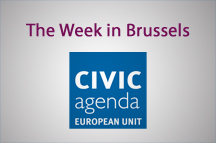.gif) It is of course a matter of common sense that membership of the Eurozone necessitates the surrender of fiscal sovereignty – and yet it tends to be only at times of crisis that Member States are compelled to confront the full extent of that sacrifice. True to form, the tensions at the heart of the Eurozone were once again in the spotlight this week as the newly elected Greek government engaged in a vigorous charm offensive, criss-crossing European capitals, attempting to secure a new deal in relation to Greece’s €240 billion bailout.
It is of course a matter of common sense that membership of the Eurozone necessitates the surrender of fiscal sovereignty – and yet it tends to be only at times of crisis that Member States are compelled to confront the full extent of that sacrifice. True to form, the tensions at the heart of the Eurozone were once again in the spotlight this week as the newly elected Greek government engaged in a vigorous charm offensive, criss-crossing European capitals, attempting to secure a new deal in relation to Greece’s €240 billion bailout.
Greek tragedy
On Wednesday, Greek Finance Minister Yannis Varoufakis met with Mario Draghi, President of the European Central Bank (ECB) in Frankfurt. Hours later the ECB seemed to indicate that further rule bending was off the agenda by issuing a statement announcing that it would no longer be accepting Greek government bonds as security for ECB funding for commercial banks.
This means that the burden of bank financing will now fall upon Greece’s Central Bank to provide support from its Emergency Liquidity Assistance programme – albeit at significantly higher interest rate than offered by the ECB. Shares in Greek banks fell sharply as a result of this news, with the Athens stock market down by more than 6%. By mid-morning the Spanish and Italian markets were also trading down by 1%.
 On Thursday it was Mr Varoufakis’ turn to head to Brussels for a meeting with German Finance Minister Wolfgang Schäuble, a staunch advocate of austerity-led fiscal restraint. The tone of the meeting was illustrated at the ensuring press conference during which Mr Schäuble quickly ruled out the option of trimming the size of outstanding Greek debt. In response Mr Varoufakis described the current situation as a “gross indignity” whilst drawing comparisons with debt fuelled hyper-inflation in the 1920s Weimar Republic, suggesting that current conditions in Greece were similar to those that previously led to the rise of Nazi extremism in Germany.
On Thursday it was Mr Varoufakis’ turn to head to Brussels for a meeting with German Finance Minister Wolfgang Schäuble, a staunch advocate of austerity-led fiscal restraint. The tone of the meeting was illustrated at the ensuring press conference during which Mr Schäuble quickly ruled out the option of trimming the size of outstanding Greek debt. In response Mr Varoufakis described the current situation as a “gross indignity” whilst drawing comparisons with debt fuelled hyper-inflation in the 1920s Weimar Republic, suggesting that current conditions in Greece were similar to those that previously led to the rise of Nazi extremism in Germany.
Sustainable agenda
Against this backdrop of rising Eurozone tension, Neven Mimica, Commissioner for International Cooperation and Development held a press conference in Brussels on Thursday to announce his priorities for a sustainable development agenda in advance of the negotiations for the post-2015 Millennium Development Goals. The Commissioner suggested that the EU should lead by example by re-committing to the UN development target of 0.7% of national income for aid assistance, but whilst implying that this should be conditional on other middle income and emerging economies shouldering their share of financial contributions.
Perhaps predictably, this announcement attracted significant criticism from the NGO community who accused the Commission of lacking in ambition and questioned whether tentatively re-committing to a 40-year old target pending contributions from other countries could be spun as evidence of global leadership. One can certainly say it has been an eventful week in Brussels when both the ambassadors of Greek financial diplomacy and the international development community are simultaneously accusing the Commission of playing negotiating tactics at the expense of people’s future livelihoods.












